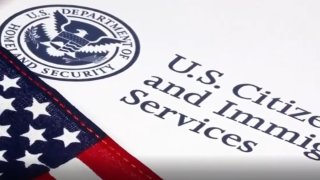
Word has spread swiftly around the small working-class city of St. Albans about looming furloughs at its U.S. Citizenship and Immigration Services center, the largest employer in the city that just went through layoffs at its hospital.
USCIS has warned that if it doesn’t receive $1.2 billion by Aug. 3, it will be forced to furlough about two-thirds of its workforce of nearly 19,000 people nationally. U.S. Sen. Patrick Leahy, D-Vt., said Friday that he had confirmed that the furloughs had been delayed to Aug. 31.
In Vermont, the agency employs about 1,700 workers in several locations and about 1,100 received furlough notices.
“The impact is going to be huge,” said Tim Smith, mayor of the city of about 7,000 people on the Canadian border. “It’s 400, 450 good-paying jobs across the whole spectrum and the trickle-down effect to businesses — buying new cars, going out to eat, all that stuff — we don’t know what that will be but that should be significant, as well.”
Four other major USCIS service centers exist around the country but are in larger areas such as Arlington, Virginia, and Irving, Texas, where the impact may not be so drastic.
The news follows layoffs at Northwestern Medical Center, the second-largest employer, and comes as the dairy industry has been struggling for years with low milk prices, said Smith, who is also executive director of the Franklin County Industrial Development Corporation. On top of that, restaurants and shops endured weeks of shutdowns under the governor’s order amid the coronavirus pandemic. The city’s unemployment rate was 2.7% before the pandemic and rose to 11.4% by June, in a state that previously had one of the lowest jobless rates in the country.
On a recent weekday mid-morning, the sidewalks were mostly empty on the half dozen blocks of the historic downtown of brick and other buildings dotted with shops, restaurants, and businesses. A few patrons stopped by to grab a coffee at the Catalyst Coffee Bar or a drink at a juicery while several others walked in the park across the street.
Local
Karen Scheffler, owner of the Catalyst, said she was thinking about how the workers will do and how the furloughs will hurt business.
”They’re great supporters of a lot of businesses in St. Albans so we’ll feel it,” she said.
Immigration workers had often come in for lunch, some regularly, at Mimmo’s Pizzeria and Restaurant on Main Street, but not so much since the pandemic hit, said manager Carlo Spano.
“These people have been working hard and it’s pretty sad, the situation,” Spano said, as he took a break from cleaning the restaurant’s entryway. “It’s a big chunk of our community.”
Fifty years ago, the city’s unemployment rate was in the double digits because of a decline in the railroad, Smith said. The organization that he now heads was founded and has recruited manufacturing to fill those voids.
Over the years, U.S. Sen. Patrick Leahy, D-Vt., helped to get the first USCIS service center in St. Albans and to expand the agency in the state. The large low-slung rectangular building and parking lot is surrounded by a chain-link fence with a security guard at the entrance at the edge of the city near a residential neighborhood.
Leahy and Montana U.S. Sen. Jon Tester, also a Democrat, sent a letter to federal officials on Tuesday asking them to postpone the furlough plans.
“During this pandemic with record unemployment, needlessly forcing these hardworking Americans into unemployment will crush the morale of the workforce and put an untold number of families into unnecessary financial distress,” they wrote. Leahy also said this month that thousands of future U.S. citizens are stuck in limbo, with the agency refusing to do remote naturalization ceremonies.
USCIS gets nearly all of its $4.8 billion budget from fees it charges for applications to live or work in the country. Revenue already dropped under Trump, after his administration imposed a number of immigration restrictions. The agency says COVID-19 caused it to drop by half.
There is hope, however, that Congress will help.
Legislation introduced July 9 would provide the emergency funding and authorize the citizenship agency’s plan to repay the money with a 10% surcharge on the fees it charges people seeking to live or work in the U.S. The bill was introduced by Rep. Emanuel Cleaver, a Democrat from Missouri, and Rep. Jeff Fortenberry, a Republican from Nebraska, whose districts are home to hundreds of people who work in USCIS service centers.
It’s unclear if Congress could act on the legislation before its August recess. Funding for the agency could also be included in any new stimulus package adopted to deal with the economic fallout of COVID-19.
Until then, those workers are in limbo.
“We have couples, husbands and wives, (who have families) that work there so it’s devastating,” said Danielle Spooner, head of the union that represents USCIS employees. Spooner works as an immigration service officer and was notified on June 26 that she will be furloughed.
Some employees moved from other parts of the country for the jobs in St. Albans, she said.
“They’re starting out in their career,” she said. “What’s safer than the government?”
___
AP reporter Ben Fox contributed from Washington.



